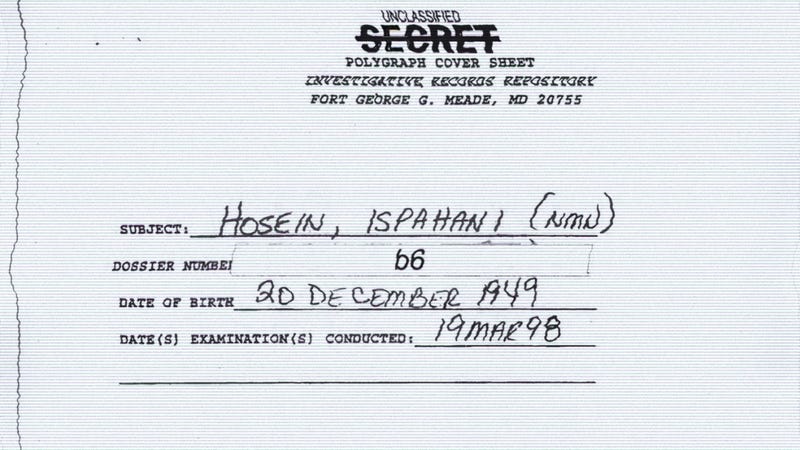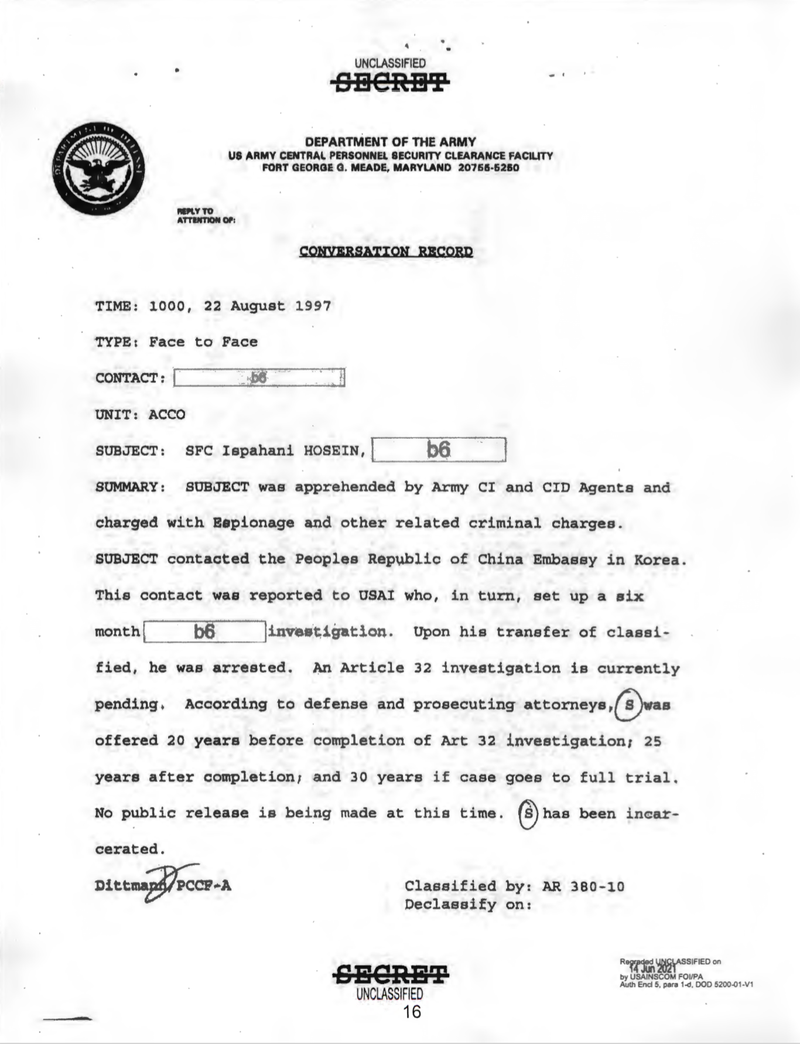
When a U.S Army sergeant walked into the Chinese embassy in South Korea, in uniform, and in broad daylight one day in 1997, some eyebrows were raised to say the least.
That's when Sgt. 1st Class Ispahani Hosein met with Chinese officials and offered to sell them a U.S. military radio.
An intelligence asset, a spy recruited by a friendly third country's intelligence service took notice and reported the incident to his handler. Months later, Hosein's attempt at espionage was reported to the U.S. military.
The 501st Military Intelligence Brigade initiated a secret counterintelligence investigation called Cablet Rope.
Obfuscated by the Army for decades, this story has been pieced together via FOIA requests, documents furnished to Connecting Vets, and interviews with one of the counterintelligence agents involved in the military's investigation.
Assigned to the U.S. Army Communications-Electronics Command (CECOM), Hosein had access to Army radios and communications systems. While he lived in Seoul, his administrative office was in Inchon, and the depot he worked out of was located in Uijeongbu.
From the perspective of counterintelligence agents assigned to his case, the sergeant had all the problematic indicators of someone who may betray their country.
“He had money problems, he had gambling problems, he had drinking problems, he had infidelity problems with multiple women and one young man from the 2nd Infantry Division who definitely was not his wife,” said Guy Hardman, who was one of the counterintelligence agents assigned to the case.
Connected Vets attempted to reach out to Hosein but phone calls and emails were not returned by the time of publication.
In a role as essentially a supply sergeant, Hosein's job was to receive new radio equipment and then field it out to various American military units in South Korea. This put him in a position with access to sensitive military communications systems.
The would-be Chinese intelligence asset was put under surveillance by counterintelligence agents, who, according to Hardman, had some difficultly changing out personnel and vehicles so that they were not spotted by Hosein. As in some parts of South Korea, everyone knew each other so it was harder to blend in. This went on for about six months, during which time Hosein visited two other embassies.

As the surveillance went on, Hosein's observed behavior alternated between boring and erratic. According to Hardman, he once told a woman at the NCO club that he was a Chinese spy. He loved to buy people drinks at the club, and in one instance picked up a male soldier. Hardman speculated that when someone secretly betrays their country, it puts them under a lot of stress and anxiety which expresses itself in unexpected ways.
As the investigation was concluding, a U.S. Army officer and a warrant officer who were ethnically Chinese flew to South Korea and role-played Chinese intelligence agents. They apologized to Hosein for not meeting with him earlier but said they were now ready to parley. They ushered Hosein into a limousine they had rented for the occasion.
During the meeting Hosein attempted to sell to them a SINGAR radio system, explaining to the undercover Army officers that if they understood how the radio system worked they could figure out how to defeat it and prevent American soldiers from communicating with one another.
The undercover officers paid Hosein $2,500 for his time, Hardman said. He sent $1,000 home to his wife, spent $500 on Hawaiian shirts at the PX, and blew the rest on booze and gambling.
Hosein was arrested July 14, 1997, as he was out-processing from the Army, three days away from retirement. The sergeant was facing 20 years for attempted espionage. After a trial in 1998, he was convicted and sentenced to ten years at Leavenworth and then a military prison at Fort Lewis. He was released in 2008.
“For the life of me, I just can't understand why,” Hardman said, confused as to why Hosein tried to betray his country to the Chinese government.
The capture of a would-be spy and his conviction was kept quiet by the Army at the time.
“Us getting involved and doing something right, means there was a series of failures to the left of boom,” Hardman said in regards to why the case was kept so quiet even after the conviction.
In official Department of Defense histories written about counterintelligence convictions, Hosein's case is notably absent.
“The man with the shiny stuff on his hat does not want that on his record,” Hardman said. The military intelligence brigade wrote up a press release on the event which Hardman says was shut down by the commander of the 8th Army.
Why? As Hardman pointed out, “A counterintelligence success means a series of other failures."
Want to get more connected to the stories and resources Connecting Vets has to offer? Click here to sign up for our weekly newsletter. Reach Jack Murphy: jack@connectingvets.com or @JackMurphyRGR.



